NAIROBI, Kenya: Now approaching its fourth month, the conflict in Sudan has continued to intensify with little sign of the feuding factions returning to the negotiating table.
More than 4 million people have now fled from their homes — 3.2 million people displaced internally, and close to 900,000 people who have crossed the border into Chad, Egypt, South Sudan and other countries.
Despite the nonstop fighting, neither side is believed to be close to achieving victory or making significant battlefield gains. Nevertheless, many see dialogue following by power sharing as the only way to achieve de-escalation in the short or long run.
Malik Agar, deputy chairman of Sudan’s Sovereign Council, recently set out a government-proposed road map to end the conflict, beginning with the separation of the warring parties and culminating in a comprehensive political process.
Agar’s proposal, outlined on Aug. 6, prioritized the delivery of humanitarian aid and the safeguarding of civilians with a subsequent shift of focus toward an inclusive political process with power-sharing agreements.
However, analysts remain cautious about any such peace initiatives, pointing to several factors that keep the military and its paramilitary foe from committing themselves to a lasting settlement, thereby prolonging the conflict.
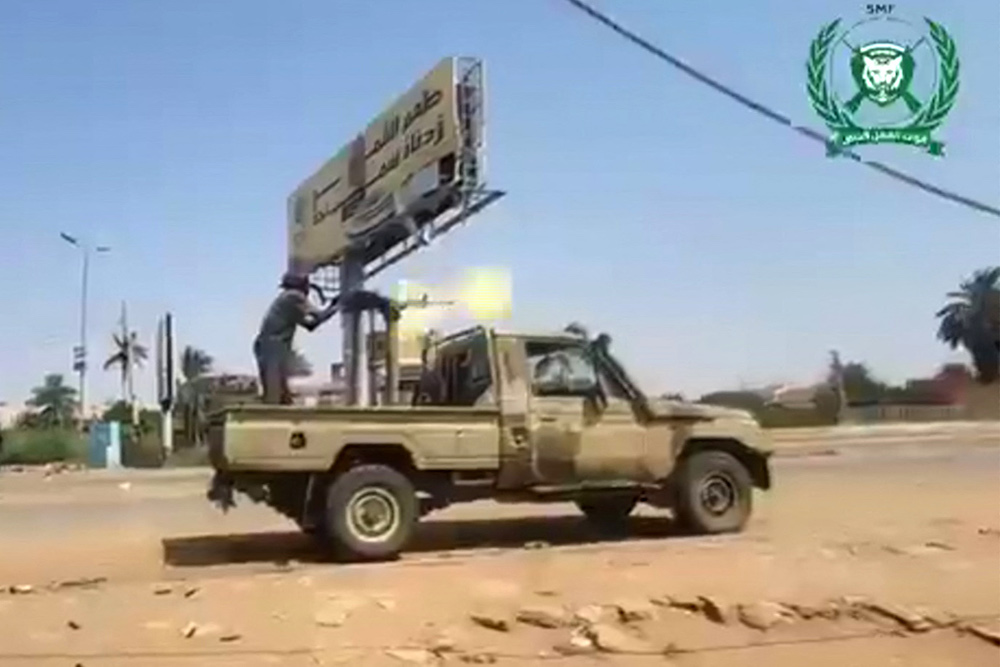
This grab from UGC video footage posted on social media on August 8 shows a member of the Sudanese Armed Forces (SAF) firing an automatic machine gun turret mounted on the back of a truck towards positions held by the Rapid Support Forces in central Omdurman. (AFP/UGC image)
“There have been scarce instances of ceasefires with enduring longevity. Especially in the initial stages of the conflict, ceasefires were frequently breached within mere hours,” Abiol Lual Deng, a South Sudanese-American political scientist, told Arab News.
“This underscores a situation where both sides seem unwilling to accept victory for the opposing faction.”
Instead, analysts believe efforts are needed to address the root causes of the conflict if a sustainable resolution is to be found, including steps to reduce militarization and tribalism, while also reviving the waning interest of the international community.
The power struggle between the Sudanese Armed Forces, led by Abdel Fattah Al-Burhan, and the Rapid Support Forces, commanded by Mohamed Hamdan “Hemedti” Dagalo, escalated into violence on April 15.
The conflict has resulted in thousands of casualties, millions of displaced people, and a major humanitarian emergency.
Fighting has killed at least 3,900 people nationwide, according to a conservative estimate by the Armed Conflict Location and Event Data Project, while more than 4 million people have been uprooted from their homes, according to the UN Refugee Agency, UNHCR.
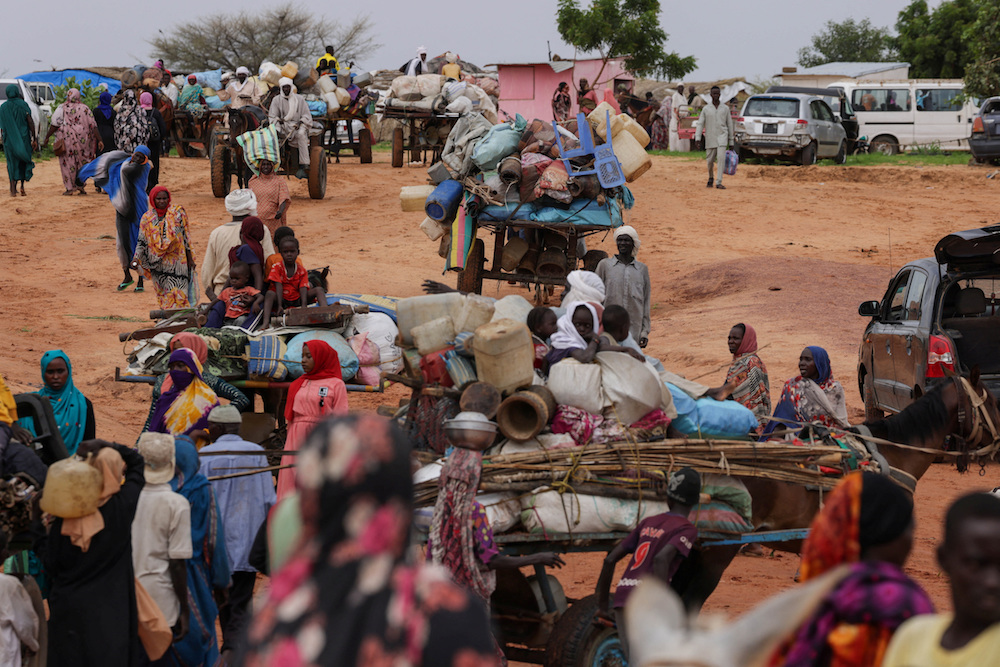
Chadian cart owners transport belongings of Sudanese people who fled the conflict in Sudan's Darfur region, while crossing the border between Sudan and Chad in Adre, Chad August 4, 2023. (Reuters)
The UN says more than 6 million people are “just one step away from famine,” as aid groups struggle to deliver life-saving assistance through bureaucratic hurdles, security challenges and targeted attacks.
Despite the efforts of the international community to initiate talks and find a solution, the conflict has persisted, as both sides have repeatedly violated a series of fragile ceasefires, leading to the suspension of peace talks.
The SAF withdrew its negotiating delegation from the Jeddah process in July due to the RSF’s refusal to redeploy its forces outside Khartoum.
Diplomats and aid agencies are concerned about the consequences of a prolonged conflict, both from a humanitarian standpoint and as a matter of wider regional security.
Indeed, the violence threatens to push the nation into an all-out civil war, which could drag neighboring states into the fray and leave borders open to exploitation by extremist groups.
The SAF has in recent weeks been ramping up its mobilization through the establishment of training camps in the northern River Nile state and the town of Kassala, providing basic training to volunteers — some of whom are reportedly underage.
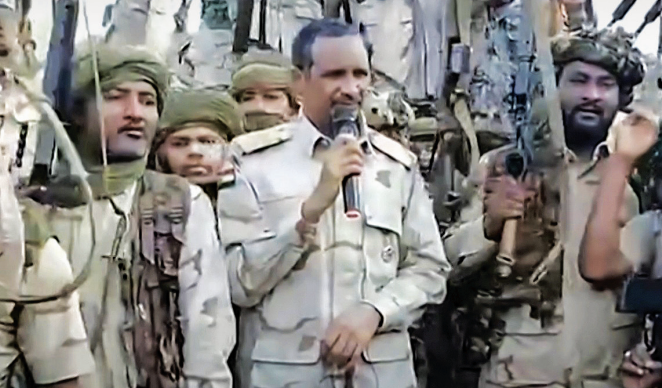
An image grab taken from a handout video posted on the Sudanese paramilitary Rapid Support Forces (RSF) page on Twitter on July 28 shows its commander Mohamed Hamdan Daglo addressing RSF fighters at an undisclosed location. (AFP)
Concerns have been multiplied by the fact that recruitment appears to follow tribal lines, which could aggravate inter-communal tensions. Developments such as these could also serve to prolong the conflict.
Sudan had long been undergoing a process of militarization even before the latest uptick in violence. Both the SAF and the RSF had already become the biggest employers in the country, outstripping even the Ministry of Education.
For many in Sudan, the SAF, despite numerous allegations of atrocities, remains associated with statehood, while the RSF is seen as a mercenary militia that grew from a provincial paramilitary unit into a force capable of challenging the national army.
INNUMBERS
* 3,900 Conservative estimate of people killed. (ACLED)
* 4m People have been uprooted from their homes. (UNHCR)
* 80% Proportion of Sudan’s hospitals now out of service. (WHO)
* 6m People who are “just one step away from famine.” (UN)
“The RSF, having no public support in the capital, relentlessly pursues a campaign of violence to displace people that they have no trust in,” Osama Ahmed Odorous Ahmed, an associate professor of strategic and security studies, told Arab News.
“Now, they want to gain control over strategic locations by pursuing grievous offenses including looting, rape, and merciless attacks on innocent civilians.”
The RSF’s lack of support among the people of Khartoum might end up being its Achilles’ heel, however, forcing it to ultimately seek a compromise with the SAF.
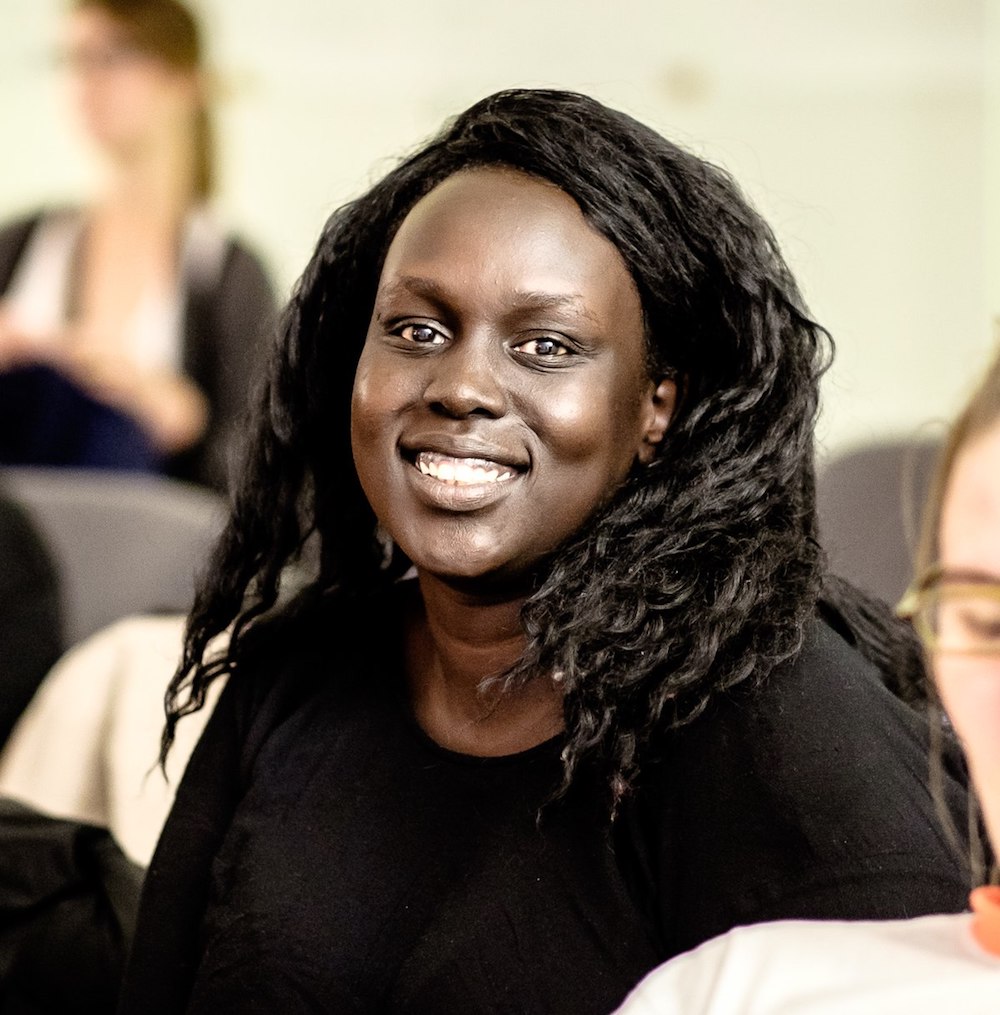
Sudan’s history is one of resilience and perseverance, and its people deserve a chance at peace and stability, said Abiol Lual Deng, a South Sudanese-American political scientist. (Supplied)
Marco Arnaboldi, a security professional and an expert on militant Islamism, argues that because the RSF is “well aware of facing opposition from a restive population, which in the end hinders their ability to consolidate power,” it will come to an agreement with the SAF at some point.
He says the RSF’s strategic approach is therefore to bolster its military position before embarking on any negotiations, which makes a prolonged stalemate the most likely scenario.
“The RSF is resolute in enhancing its position through continued military advancements, recognizing the complexities on the ground. Their goal isn’t total control of the nation, let alone effective governance,” Arnaboldi told Arab News.
“From a purely military perspective, a long stalemate looks likely, as the SAF is also showing a dreadful inability to regain the lost territories, especially in Khartoum.
“The RSF, while it is expanding its military control over the country, is grappling with internal disorganization and inadequate supply lines.”
The notion of pressuring the RSF to relinquish control and embrace genuine political discourse might offer a ray of hope, yet this path comes with its challenges.
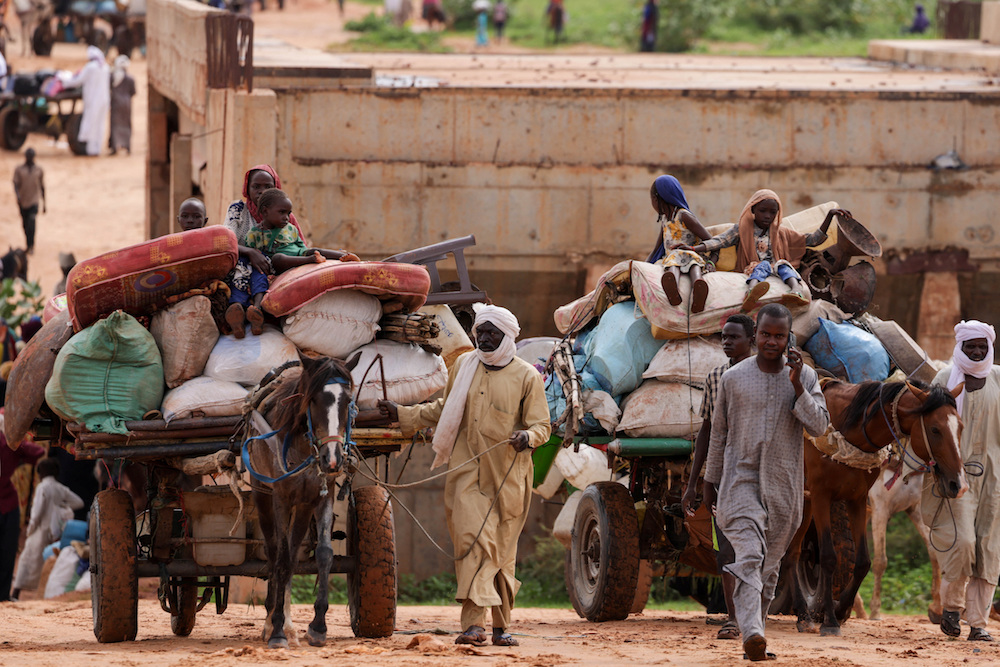
Experts say addressing the conflict’s root causes is key to preventing further escalation and achieving a lasting solution. (Reuters)
“The splintering of authority and interests among different factions and elites has set back the chances of a harmonious outcome for the nation,” said Odorous Ahmed.
“There is potential for a military resolution supported by external reinforcements for the RSF, as it has external backers, but also diplomatic avenues through negotiated agreements, as well as the exertion of international pressure propelled by regional powers, and the elusive pursuit of political reconciliation.”
Deng underscored the need for a multifaceted approach to de-escalating the conflict and resuming the transition process, involving civilian leaders, regional powers, and the international community.
“A significant step involves insisting on a democratic transition, where civilian leadership plays a pivotal role in steering the nation toward stability and inclusivity,” she said.



























